|
Author
|
Topic: Save old Swedish trees
|
TINK
unregistered
|
 posted August 23, 2005 11:50 AM
posted August 23, 2005 11:50 AM
 
Well .... we are all entitled to our crushes, I suppose. I'm nursing an awful Vivaldi crush at the moment. It comes and goes. How can you not love a man called The Red Priest? That alone makes me giddy.  IP: Logged |
26taurus
unregistered
|
 posted August 25, 2005 09:42 PM
posted August 25, 2005 09:42 PM
 
 IP: Logged |
Petron
unregistered
|
 posted August 29, 2005 09:07 PM
posted August 29, 2005 09:07 PM
 
*bump*
oh and btw, let me know if you still have a "crush" on this vivaldi guy 28years from now!!!.....hehe then i'll consider it half as intense as my endless burning love for helen reddy 

    IP: Logged |
TINK
unregistered
|
 posted August 30, 2005 12:07 PM
posted August 30, 2005 12:07 PM
 
I assure you I will. Antonio can claim a certain ... ahem ...endurance factor that Ms Reddy seems to lack. Do you figure anyone will be listening to Helen 3 centuries from now? Come to think of it, is anyone, besides your esteemed self, listening to her now?IP: Logged |
Petron
unregistered
|
 posted August 30, 2005 02:49 PM
posted August 30, 2005 02:49 PM
 
good!!! then i have her all to myself!! hehe  IP: Logged |
Petron
unregistered
|
 posted September 01, 2005 10:22 PM
posted September 01, 2005 10:22 PM
 

Apes 'extinct in a generation'
By Richard Black
BBC News website environment correspondent
Gorilla in Kahuzi-Biega National Park in DR Congo. Born Free Foundation
The great apes are our kin... but we have not treated them with the respect they deserve--Kofi Annan Some of the great apes - chimps, gorillas, and orangutans - could be extinct in the wild within a human generation, a new assessment concludes. Human settlement, logging, mining and disease mean that orangutans in parts of Indonesia may lose half of their habitat within five years. There are now more than 20,000 humans on the planet for every chimpanzee. The World Atlas of Great Apes and their Conservation is published by the UN's environment and biodiversity agencies. It brings together data from many sources in an attempt to assess comprehensively the prospects for the remaining great apes; the gorillas, chimpanzees and bonobos of Africa, and the orangutans of south-east Asia. Gloomy outlook
The great apes; status check At-a-glance
The general conclusion is that the outlook is poor. "All of the great apes are listed as either endangered or critically endangered," co-author Lera Miles from the World Conservation Monitoring Centre near Cambridge told the BBC News website. "Critically endangered means that their numbers have decreased, or will decrease, by 80% within three generations." One critically endangered species is the Sumatran orangutan, of which around 7,300 remain in the wild. Most live in Aceh province at the northern tip of Sumatra, which saw armed conflict for decades between the Indonesian government and separatist rebels, and which suffered heavily during December's tsunami. The ranges of the Sumatran and Bornean orangutan. Unep-WCMC In mid-August, a peace deal was signed which may end the 29-year conflict. "The irony is that just as things are getting better for the people of Aceh, they're getting worse for wildlife, with people collecting timber, dormant logging concessions being activated, and illegal logging as well," said Dr Miles. "Projections show that in 50 years' time, there could be as few as 250 left in the wild; but that's not a viable size for a population." The other species of orangutan, in Borneo, is much better off, with around 45,000 animals remaining; though data gathered for this report by the United Nations Environment Programme (Unep) and its biodiversity agency the World Conservation Monitoring Centre (WCMC) suggests that numbers have declined 10-fold since the middle of the last century. African falls The mountain gorilla of the Democratic Republic of Congo, and the Cross River gorilla, found on the border between Nigeria and Cameroon, are also listed as critically endangered, with numbers estimated at 700 and 250 respectively. For gorillas and chimpanzees, ebola fever is emerging as a significant threat.
Why ebola is now taking its toll of apes is not clear, but may be connected with forest clearance. One theory is that the as yet unidentified animal which harbours the virus lives on the edges of forests; logging creates more edges, and so enhances the transmission of ebola.
An expert group of researchers which convened in May has just released an action plan for conserving apes in western equatorial Africa. "If we find ways to protect apes from the ebola virus, we also will protect humans," it concludes.
Bushmeat hunting and habitat removal by logging are also major issues.
The 1990s saw forest cover declining in all African countries where gorillas, chimpanzees and bonobos live. Close to human The World Atlas comes with a foreword by UN Secretary-General Kofi Annan, in which he argues forcibly for the preservation of apes. "The great apes are our kin," he writes. "Like us, they are self-aware and have cultures, tools, politics, and medicines; they can learn to use sign language, and have conversations with people and with each other. "Sadly, however, we have not treated them with the respect they deserve."
His thesis on the close kinship of ape and man has been reinforced by the publication this week of the chimpanzee genome, demonstrating that humans and chimps share 99% of their active genetic material.
But stopping the decline of ape populations may not be easy, with human encroachment continuing, often under the pressure of poverty. A key player is the Great Ape Survival Project (Grasp), launched under UN auspices in 2001, which aims to establish strategies for all regions of Africa and Asia which still have ape populations. It holds its first council meeting next week in the Democratic Republic of Congo.
http://news.bbc.co.uk/2/hi/science/nature/4202734.stm
****** IP: Logged |
26taurus
unregistered
|
 posted September 22, 2005 06:39 PM
posted September 22, 2005 06:39 PM
 
Petron, come back.  Alot of people miss you here. I'd love to see more of you, especially in the other forums. Hope youre well.  ------------------
What the caterpillar calls the end of the world the master calls a butterfly.
~Richard Bach IP: Logged |
26taurus
unregistered
|
 posted September 22, 2005 07:48 PM
posted September 22, 2005 07:48 PM
 
OMG, I almost forgot!! You were in one of my dreams the other night. I was in a room lined with bookshelves and pulled out a book that you had just written. I cannot remember the author's name on it now, but somehow I knew in the dream that the name was actually 'Petron from LL's real name'. All I can remember now is a black book with a square design on the cover in the middle and the word 'Pythagoras' in the title. I embarassingly admit that I didnt know squat about Pythagoras and just googled the name. It's interesting that they call him the 'first pure mathematician' and you seem very much into math and numbers. Dont know if that means anything to you, but I thought it was kinda neat. Ever plan on writing a book?I had another dream recently that I was lexigraming a word and I cant for the life of me remember what it was now. Got to start keeping a dream journal......
 IP: Logged |
Petron
unregistered
|
 posted November 09, 2005 06:16 PM
posted November 09, 2005 06:16 PM
 
hi 26t ...ok i'm back  ahh no wonder i havnt been able to find books lately!!!
just so you know, the next time you go rummaging thru my astral library.....the books go back in reverse alphabetical order according to subject, not author or title.... 
other than that feel free to browse..  and yes you seem to be seeing something connected to my 'patterns of 11's' post.....
http://www.linda-goodman.com/ubb/Forum2/HTML/001590.html maybe that lexi word was in there too?
IP: Logged |
Petron
unregistered
|
 posted November 09, 2005 06:17 PM
posted November 09, 2005 06:17 PM
 
Japanese Whalers to Kill Endangered Species
*
Last edited: 08-11-2005For immediate release: Tuesday 8th November 2005 The Japanese whaling fleet left port this morning to kill almost 1,000 whales, including endangered fin whales. The fleet is heading towards the Southern Ocean, flouting an international ban on commercial whaling. Earlier this year, Japan announced its intention to more than double its cull of minke whales to 935 and to increase its programme further by killing 70 fin and 50 humpback whales - both of which are endangered - within the next three years. The Japanese government is able to do this by exploiting a loophole in international law which permits it to issue licences for 'scientific whaling'. However, the meat from this 'scientific' programme ends up being sold. Fin whales, the second largest whales in the world, are listed as endangered under the Convention on International Trade in Endangered Species and by the World Conservation Union. Their numbers have still not recovered from commercial whaling, and are under 20% of their original population size. Humpback whales typically weigh about 30 tonnes, and are also endangered. They can live for around 80 years and are renowned for songs that can last for hours. Willie Mackenzie, Greenpeace oceans campaigner, said: "Hundreds of whales are going to be killed by this fleet despite an international ban on commercial whaling. "Japan must immediately recall their whaling fleet, and then end this sham of 'scientific' whaling altogether. The world's remaining whale populations face a multitude of threats from humanity, such as the effect of climate change on the Antarctic ecosystem; whale populations have suffered enough after over a century a commercial whaling, without decimating them even further and having the gall to pretend it's being done for science." ENDS Images of the fleet's departure are available. For more information, contact the Greenpeace press office on 020 7865 8255. http://www.greenpeace.org.uk/contentlookup.cfm?UCIDParam=20051108140859 IP: Logged |
Petron
unregistered
|
 posted November 09, 2005 06:19 PM
posted November 09, 2005 06:19 PM
 
Iceland slammed after killing almost 40 whales
*
Last edited: 18-08-2005Iceland's annual whale hunt has stopped for this year after killing almost 40 minke whales. The so-called 'scientific' hunt has faced fierce criticism from Greenpeace, who have pointed towards the damage the hunt is causing to Iceland's international reputation and growing tourist industry. The whale hunt was worth an estimated US$4million at its peak, while whale-watching alone attracts over 80,000 tourists and is worth almost US$20million a year. An online pledge organized by Greenpeace, which asked people to consider a holiday in Iceland if whaling was stopped, has drawn over 65,000 people, which potentially represents over US$76million in tourism revenue. Iceland's storage freezers are full with up to 40 tonnes of unsold whale meat and blubber from the 2003 and 2004 hunts. Only a quarter of last years catch was sold, yet Iceland persisted in taking this year's 'scientific' quota of 39 minke whales. Willie Mackenzie, Greenpeace oceans campaigner, said: "The Icelandic tourist association and whale watching operators have made it clear that whaling damages the reputation of the nation and has a negative impact on tourism. In recent years, tourism has become a major source of income in Iceland and whale watching alone is worth more than $18 million a year. 'Scientific' whaling brings Iceland no answers and no revenue". "Over 300,000 whales, dolphins and porpoises die every year due to a multitude of threats, such as climate change, pollution and destructive fishing. Hunting is the one threat to whale populations we can, and should, eliminate immediately." Further information:
Contact the Greenpeace press office on 020 7865 8255
greenpeace.org IP: Logged |
maklhouf
unregistered
|
 posted November 10, 2005 07:45 AM
posted November 10, 2005 07:45 AM
 
I might have known there was something interesting lurking under the icky title!IP: Logged |
maklhouf
unregistered
|
 posted November 10, 2005 07:45 AM
posted November 10, 2005 07:45 AM
 
aaaaaaargh!!!IP: Logged |
Petron
unregistered
|
 posted November 10, 2005 05:21 PM
posted November 10, 2005 05:21 PM
 
you mean youve been double-posting instead of clicking?! aaargh!!! get clicking man!!   IP: Logged |
Petron
unregistered
|
 posted December 18, 2005 09:08 PM
posted December 18, 2005 09:08 PM
 

THE ISSUES
What's the problem?
Kleenex, one of the most popular brands of tissue products in the world, contributes to the destruction of ancient forests. Its manufacturer, the Kimberly-Clark corporation, has been unwilling to improve its practices, continuing to rely on paper and pulp made from clearcut ancient forest including Canada’s Boreal forest. Kimberly-Clark clears these ancient forests, essential in fighting climate change and providing home to wildlife like caribou, wolves, eagles and bears,into products that are flushed down the toilet or thrown away.
What are ancient forests?
Ancient forests are the planet’s old-growth and original forests. According to the World Resources Institute, almost 80 per cent of the world's original forests have been degraded or completely destroyed. Much of this loss of ancient forests is due to human industrial use of these forests including logging, clearing for agricultural land, and oil, gas and hydroelectric development. Who is Kimberly-Clark? Kimberly-Clark is the largest tissue product company in the world. It manufacturers the popular Kleenex brand of tissue products, which is sold in several formats – toilet paper, facial tissue and napkins. Kimberly-Clark produces 3.7 million tonnes (4.08 million tons) of tissue products annually and generates net sales of $14.3 billion US. The company has offices, factories and mills in 38 countries, and its products are sold in 150 countries. Kimberly-Clark also produces a line of commercial toilet paper and paper towels that are sold to institutions like universities, high schools, governments and businesses.
http://kleercut.net/en/theissues EMAIL Kimberly-Clark and Kleenex: Stop Clearcutting Ancient Forests
http://www.actionworks.ca/clientfiles/greenpeace_canada/actioncentres/kleercut-eng/takeaction.jsp 
IP: Logged |
lotusheartone
unregistered
|
 posted December 18, 2005 09:36 PM
posted December 18, 2005 09:36 PM
 
I guess, I'll do my best not to cry, hehe
 IP: Logged |
Petron
unregistered
|
 posted December 18, 2005 11:14 PM
posted December 18, 2005 11:14 PM
 
here you go lotusheart
Greenpeace Shopper's Guide to Ancient Forest Friendly Tissue Products.
http://www.greenpeace.ca/tissue/
IP: Logged |
Christinaeavynwarner
unregistered
|
 posted December 30, 2005 08:43 PM
posted December 30, 2005 08:43 PM
 
lol..wow. heheIP: Logged |
Petron
unregistered
|
 posted March 13, 2006 11:10 PM
posted March 13, 2006 11:10 PM
 
Burst oil pipeline causes 'catastrophe' in Alaska
By Andrew Gumbel in Los Angeles
Published: 14 March 2006A burst pipeline in Alaska's North Slope has caused the Arctic region's worst oil spill, spreading more than 250,000 gallons of crude oil over an area used by caribou herds and prompting environmentalists again to question the Bush administration's drive for more oil exploration there. The leak was first spotted by a British Petroleum worker 11 days ago, and was reported to have been plugged a few days later. Initial hopes expressed by BP that the spill was limited to a few tens of thousands of gallons proved to be over-optimistic. Alaska's Department of Environmental Conservation has steadily increased its estimate of the size of the spill, the latest estimate putting it at around 265,000 gallons. "This historic oil spill is a catastrophe for the environment," Natalie Brandon, of the Alaska Wilderness League, said in a statement. "Tone-deaf politicians in Congress should now stop trying to push for more drilling through sneaky manoeuvres ... The fact that the oil spill occurred in a caribou crossing area in Prudhoe Bay is a painful reminder of the reality of unchecked oil and gas development across Alaska's North Slope." A second battle, meanwhile, is taking place in a previously untouched corner of the National Petroleum Reserve on the North Slope. The Bush administration has allowed oil companies to prospect for oil and gas in an area covering 389,000 acres. Environmental groups have responded with a federal lawsuit, filed last Friday, in which they contend that the Department of the Interior has violated the Endangered Species Act and other laws in an area noted for its flocks of migratory geese. It is not just environmentalists who oppose the administration's plans. Several prominent energy analysts, as well as Washington politicians, argue that the likely yield in unexplored areas of the North Slope is not large enough to justify the intrusion. http://news.independent.co.uk/world/americas/article351121.ece IP: Logged |
Petron
unregistered
|
 posted March 16, 2006 01:19 AM
posted March 16, 2006 01:19 AM
 
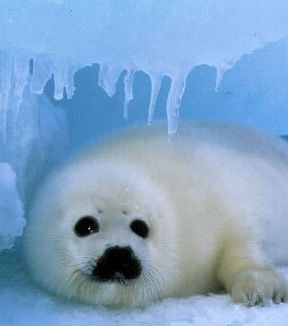 Mar 15, 8:40 PM EST Canada's Seal Hunt to Get Under Way By BETH DUFF-BROWN
Associated Press Writer TORONTO (AP) -- Canada's contentious seal hunt will soon start, the government accounced Wednesday, despite protests by former Beatle Paul McCartney and other animal-rights activists who condemn the killing of the pups as inhumane. Fisheries and Oceans Minister Loyola Hearn charged that the media had misrepresented the hunt, and said Canada is committed to ensuring the seals are killed by humane methods. "Canada's harp seal herd is a conservation success story," Hearn said in Ottawa. "We continue our surveillance and monitoring to make sure that Canada's is the most tightly regulated, closely watched and, above all, most humane seal hunt in the world." Registered sealers will be allowed to kill up to 325,000 pups in the ice floes off the Atlantic when the annual season opens, up from the quota of 320,000 last year, Hearn said. Aboriginal and Inuit hunters begin the commercial kill in November in Canada's frozen Arctic waters. The spring leg is slated to begin in the Gulf of St. Lawrence next week and move later to an arc about 30 to 40 miles from Newfoundland. Hearn said Canada's harp seal population is "healthy and thriving" at nearly 6 million, a threefold increase since the 1980s. McCartney and his wife, Heather Mills McCartney, took to the ice floes in the Gulf of St. Lawrence two weeks ago to frolic with the doe-eyed pups to garner international support to end the hunt. He called the practice a "stain on the character of the Canadian people." The Humane Society and International Fund for Animal Welfare have posted gruesome videos on their Web sites that show the pups being clubbed to death, some left choking on their own vomit or being skinned alive.
Hearn said these are isolated incidents and federal marine monitors have verified that most of the seal pups that are killed have lost their fluffy white fur as required by law since 1987 and are quickly jabbed through the brain with picks or shot with one quick bullet.
He said fishing communities of Quebec and Newfoundland, whose livelihoods were devastated when the Atlantic cod stocks dried up in the mid-1990s, earn 25 percent to 40 percent of their annual income by selling the seal pelts and blubber for about $70 each. The pelts used in the fashion industry are mostly sold to Norway, China and Russia. The United States has banned Canadian seal products since 1972 and the European Union banned white baby seal pelts in 1983. Last spring marked the final season for a three-year federal plan that allowed sealers to take 975,000 seals - most of them harp seals between 12 days and 3 months old. ----- On the Net: Federal agency Fisheries and Oceans Canada: http://www.dfo-mpo.gc.ca Humane Society of the United States: http://www.hsus.org CANADA_SEAL_HUNT
IP: Logged |
26taurus
unregistered
|
 posted March 19, 2006 03:09 PM
posted March 19, 2006 03:09 PM
 
 Clicking. IP: Logged |
Petron
unregistered
|
 posted March 26, 2006 01:29 AM
posted March 26, 2006 01:29 AM
 
they call themselves "hunters"  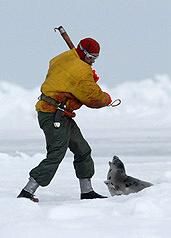
IP: Logged |
Petron
unregistered
|
 posted March 26, 2006 01:30 AM
posted March 26, 2006 01:30 AM
 
Canada hunters start killing seals, tempers flare
Mar 25, 5:27 PM (ET)By Paul Darrow OFF CANADA'S EAST COAST (Reuters) - Canadian hunters started shooting and clubbing harp seal pups on Saturday at the start of an annual hunt that is the focus of a tech-savvy protest by animal rights groups. This year, 325,000 young seals will be killed on the ice floes off the East Coast where the animals gather. Unusually warm weather means the floes are a fraction of their normal size and thickness, prompting hunters to kill the seals individually rather than clubbing them to death en masse as they cluster on the ice in pools of blood.
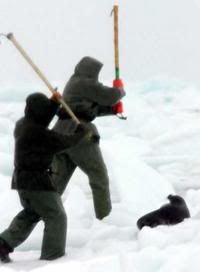
two against one just in case he gets out of hand 
IP: Logged |
Petron
unregistered
|
 posted March 26, 2006 01:30 AM
posted March 26, 2006 01:30 AM
 
"It's slow going. The ice is not full of seals all over the place," said Roger Simon of Canada's federal fisheries ministry, which oversees the hunt.The crack of rifle fire could be heard continually as hunters in boats shot seals as they lay on tiny floes and then dashed over to the bodies in hopes of retrieving them before they slipped off the ice and sank. Once the animals are killed, they are skinned and taken into the hunters' boats. The pelt is taken to make coats while the rest of the carcass is usually left behind. 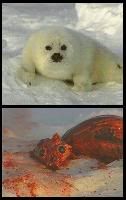 At one point a hunter, frustrated at the activists' presence, picked up the bloody carcass of a skinned seal and threw it at a small inflatable craft full of protesters and journalists. It hit the boat and sank. One sealing boat steamed straight toward the journalists' craft and turned at the last moment, sending a wave crashing over the observers. Canada says the hunt gives the local economy a crucial boost and helps keep a harp seal population of almost six million animals in check. The Humane Society of the United States has chartered a 110-foot (30-meter) boat to follow the hunt and is putting film and videos of the killings on its Web site. "It's disgusting when you stand out here and look at what the seals have been through already. They're clinging on for life as it is, thanks to the effects of global warming," said the society's Rebecca Aldworth. "I'm really appalled the Canadian government continues to allow this slaughter. There's no need for anyone to be out here killing seals," she told Reuters from the hunting zone. 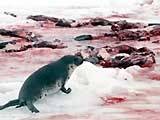 CANADA SAYS KILLINGS ARE HUMANE Prime Minister Stephen Harper said Canada was behaving responsibly and would enforce rules ensuring that the seals were killed humanely. "Unfortunately here we're to some degree the victim of a bit of an international propaganda campaign," he said on Friday. Celebrities such as former French film star Brigitte Bardot and ex-Beatle Paul McCartney called on Ottawa this week to stop the hunt. Aldworth repeated calls for an international boycott of Canadian seafood to protest what she said was "incredible cruelty at the hunt, including dragging conscious seals across the ice with boathooks, shooting seals and leaving them to suffer in agony and skinning seals alive." The first part of the hunt, which takes place near the Magdalen Islands in the Gulf of St. Lawrence, usually takes about 10 to 12 days to complete. This year's quotes is just over 90,000 seals. The second and larger stage, off the coast of Newfoundland, starts on April 4.
NEWS-SEALS IP: Logged |
Petron
unregistered
|
 posted March 26, 2006 01:31 AM
posted March 26, 2006 01:31 AM
 
 oh now i see why this is so worthwhile??
isnt she just beautiful now??  *gag*
IP: Logged | |

 Lindaland
Lindaland

 Global Unity
Global Unity

 Save old Swedish trees (Page 2)
Save old Swedish trees (Page 2)

